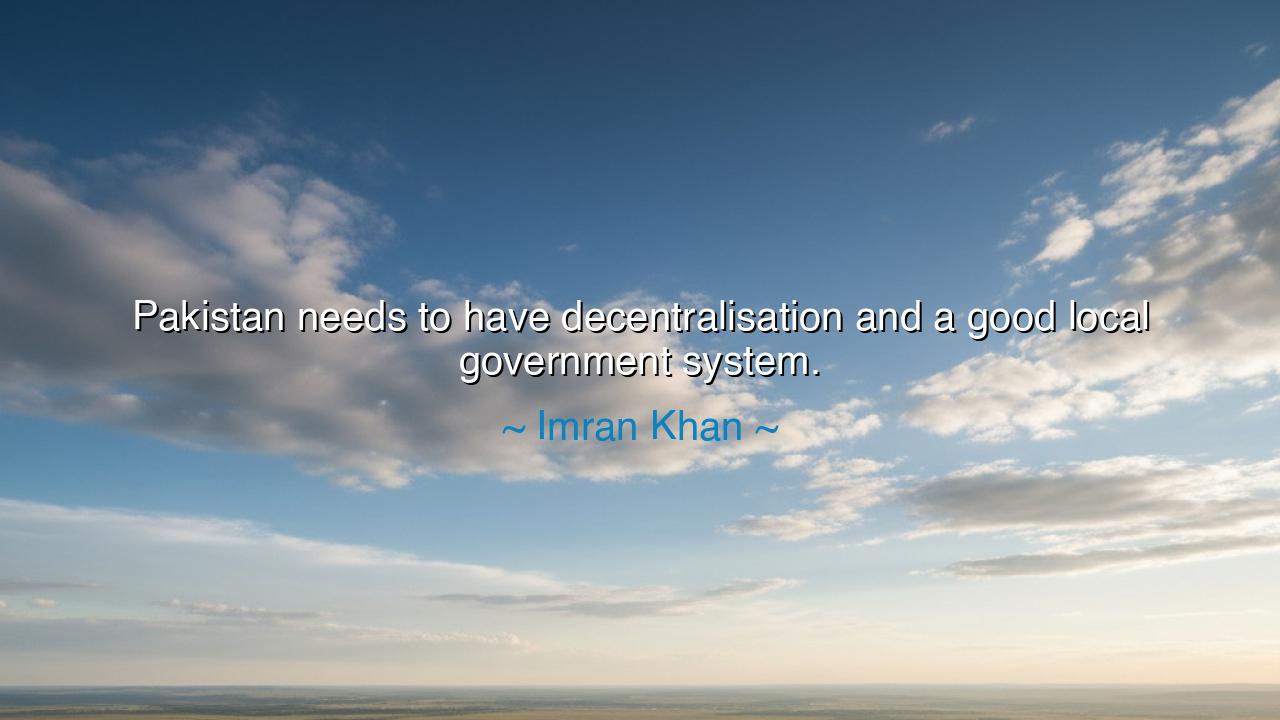
Pakistan needs to have decentralisation and a good local






The words of Imran Khan, leader, reformer, and former Prime Minister of Pakistan, echo like a call to awaken a sleeping nation: “Pakistan needs to have decentralisation and a good local government system.” These are not the words of mere policy—they are the cry of a man who understands that power without proximity becomes tyranny, and that governance without participation becomes decay. His statement is a plea to return the pulse of power to the people, to dismantle the old fortress of centralization that has too long suffocated initiative and accountability. For a nation to flourish, Khan reminds us, its power must not be hoarded at the top but distributed like water across the land, nourishing every village, every town, every citizen.
At its heart, this quote speaks of decentralisation, the sacred principle that no single hand should hold the fate of millions. In ancient times, empires rose and fell upon this very truth. When rulers governed too far from the people—when laws were written by those who never walked the streets they ruled—corruption and alienation grew like weeds in the cracks of empire. Imran Khan, like the wise reformers of old, understood that true democracy does not live in parliaments alone, but in the streets, in the homes, in the hearts of ordinary people. For when a farmer can speak directly to those who shape his destiny, when a teacher can see her voice reflected in her village council, then freedom ceases to be an ideal—it becomes a living, breathing force.
The origin of this quote lies in Khan’s lifelong struggle to transform Pakistan from a nation burdened by elite control to one guided by merit and transparency. He observed that Pakistan, though young in years, was old in its patterns—ruled by centralized authority, with distant bureaucracies deciding the fate of local communities. To him, this was not only inefficient but unjust. The absence of local government meant that the people who knew their problems best had the least power to solve them. Roads were left unbuilt, schools unfunded, and corruption flourished in the shadows of distance. Thus, Khan’s vision of decentralization was not about politics, but about restoring trust and dignity between ruler and ruled.
History offers powerful validation of his vision. In the 19th century, when Switzerland was a scattered land of villages and cantons, it faced the challenge of uniting under a single flag without extinguishing the voice of its people. Instead of imposing a central authority, it embraced local governance, giving each canton control over its own affairs. This system of autonomy became the foundation of one of the world’s most stable and prosperous democracies. The Swiss learned what Khan preaches—that liberty thrives when responsibility is shared, and that a government closest to its citizens is the one most capable of serving them.
But the lesson is also one of moral courage. Decentralisation demands humility from those in power, for it asks them to let go of control. It requires faith in the wisdom of the people, and trust that the nation’s strength lies not in a few palaces but in millions of humble homes. Imran Khan’s challenge to his country is therefore not merely administrative—it is spiritual. It calls on leaders to see their people not as subjects, but as partners; not as dependents, but as co-creators of destiny. For when power is shared, accountability is born, and with accountability comes justice.
Yet, his vision remains a difficult one, for the temptation of centralization is strong. It is easier to command from the capital than to listen to the cries of the countryside. It is easier to make grand decrees than to build humble systems that serve quietly. History warns us that nations which cling to central power eventually crumble under its weight. From the Roman Empire to the Soviet Union, those who ignored local strength sowed the seeds of their own downfall. Khan’s words, therefore, are not only a blueprint for reform but a warning against arrogance—a reminder that no government can endure unless it allows its people to breathe.
The lesson for all who hear this quote is timeless: empowerment begins at the roots, not the summit. Whether in governance, business, or community, the principle remains the same—trust those nearest to the problem to be part of the solution. Encourage local leadership, nurture initiative, and build systems that grow from the ground up. Do not wait for distant powers to fix what lies before your eyes. Begin where you stand; take responsibility for your home, your neighborhood, your nation. For the freedom of a people is not won in capitals—it is built in communities.
Thus, let the words of Imran Khan be remembered as both a warning and a promise: that the greatness of Pakistan—or any nation—will not come from the height of its rulers, but from the strength of its foundations. When power flows downward like a river—clear, pure, and abundant—then justice, prosperity, and hope will follow. But if it stagnates at the top, corruption and despair will spread. So, guard your right to govern yourselves, demand accountability, and believe, as Khan believed, that a nation rises when its people rise together, not in submission to authority, but in partnership with it.






AAdministratorAdministrator
Welcome, honored guests. Please leave a comment, we will respond soon